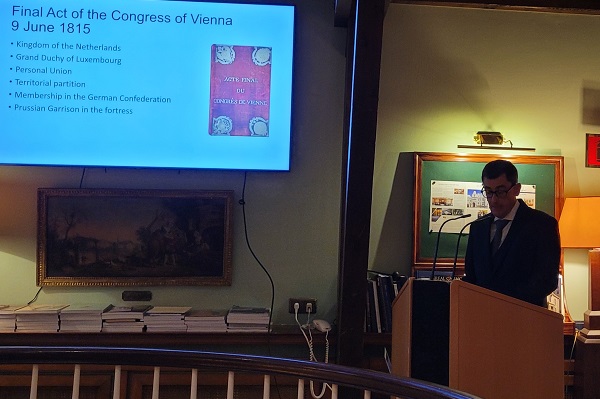 Guy Thewes;
Credit: Jazmin Campbell / Chronicle.lu
Guy Thewes;
Credit: Jazmin Campbell / Chronicle.lu
On Saturday evening, the British-Luxembourg Society (BLS) held a gala dinner at the prestigious Cercle Munster in Luxembourg-Grund as part of its 75th anniversary celebrations.
The dinner was preceded by a lecture on "British diplomacy and the birth of the Grand Duchy. The role of Great Britain on Luxembourg's road to independence (1815-1867)" by Guy Thewes, a renowned Luxembourgish historian and director of the two Luxembourg City museums (Lëtzebuerg City Museum and Villa Vauban).
Founded on 24 April 1947, the BLS is a non-profit organisation that aims to deepen, maintain and develop good relations between Luxembourg and Great Britain.
Current BLS President Louise Benjamin welcomed the 80 or so guests to this special anniversary event and noted that demand for the evening had been high. She thanked the representatives of various organisations, such as the British Chamber of Commerce for Luxembourg (BCC) and the American Chamber of Commerce in Luxembourg (AMCHAM), as well as partners, sponsors, patrons, BLS council members and other guests for their presence.
In his lecture, Guy Thewes presented a detailed summary of Luxembourg's "long and eventful history", specifically its road to becoming an independent state and the little known role played by the United Kingdom (UK) in shaping the Grand Duchy of Luxembourg as it is today. He explained how Luxembourg had changed hands many times over the years, going from the Burgundians to the Spanish Habsburgs and then the Austrian Habsburgs to being occupied by France on a couple of occasions and eventually becoming a Grand Duchy. As Guy explained, Luxembourg has occupied a "strategic position on the European chessboard" throughout its history and has links to many different countries - including the UK.
Despite seeming to be "absent in Luxembourg's long history", the UK did have a "decisive influence" on its creation as an independent state in the 19th century, clarified Guy, adding that the 75th anniversary of the BLS was an ideal opportunity to explore this in more detail. He elaborated that British leaders, such as Lord Castlereagh, the UK's then Secretary of State for Foreign, Commonwealth and Development Affairs, played an important role at the Congress of Vienna in 1815, which brought together major European powers after the collapse of the Napoleonic Empire. Among the UK's main aims (and those of some of the other powers) was to thwart potential French ambitions, i.e. by "build[ing] a strong barrier against France" (although this was not a new concept), for example in the form of a strong Kingdom of the Netherlands. There were various possibilities laid out for the future of Luxembourg at the Congress of Vienna but the UK wanted to balance the security issue (building a barrier against France) and political sensitivities (not offending William I of the Netherlands). Utlimately, Lord Castlereagh proposed that Luxembourg be placed under the sovereignty of William I's Kingdom of the Netherlands; Luxembourg was given the title of a "grand duchy" and was bound in a personal union to William I of Orange-Nassau, King of the Netherlands and the new Grand Duke of Luxembourg. At the same time, Luxembourg's membership of the German Confederation meant that a Prussian garrison was stationed within the fortress in Luxembourg City.
Guy argued that Lord Castlereagh could thus be considered the "spiritual father of the Grand Duchy". However, the Luxembourg question resurfaced with the Belgian Revolution in 1830, in which many Luxembourg residents fought on the side of the Belgian insurgents. Again, with the Kingdom of the Netherlands within its sphere of influence and the UK wanting to be "master of the game", the UK played a big part in what came next: the Treaty of London in 1839 resulted in the division of Luxembourg between Belgium and the Netherlands. This involved changes to Luxembourg's territory and borders which have remained the same ever since. It was not until the Treaty of London in 1867, however, that the Grand Duchy of Luxembourg's international status was consolidated, with the Prussian garrison withdrawing from its fortress and Luxembourg becoming a neutral and unarmed state.
Throughout this period of history, "British diplomacy showed great patience and wisdom", noted Guy, adding that the "spirit of pragmatism" of leaders such as Lord Castlereagh helped guide Europe's main players in finding a solution.
Guy's detailed presentation encompassed an array of historical archives (maps, correspondence, etc.) and was followed by a Q&A session.
BLS council member Jacqueline Spence thanked Guy for his very interesting summary of a "complex" but "fascinating" part of Luxembourg's history.
The evening continued with a cocktail and live harp music, sponsored by Banque Havilland, followed by dinner.








